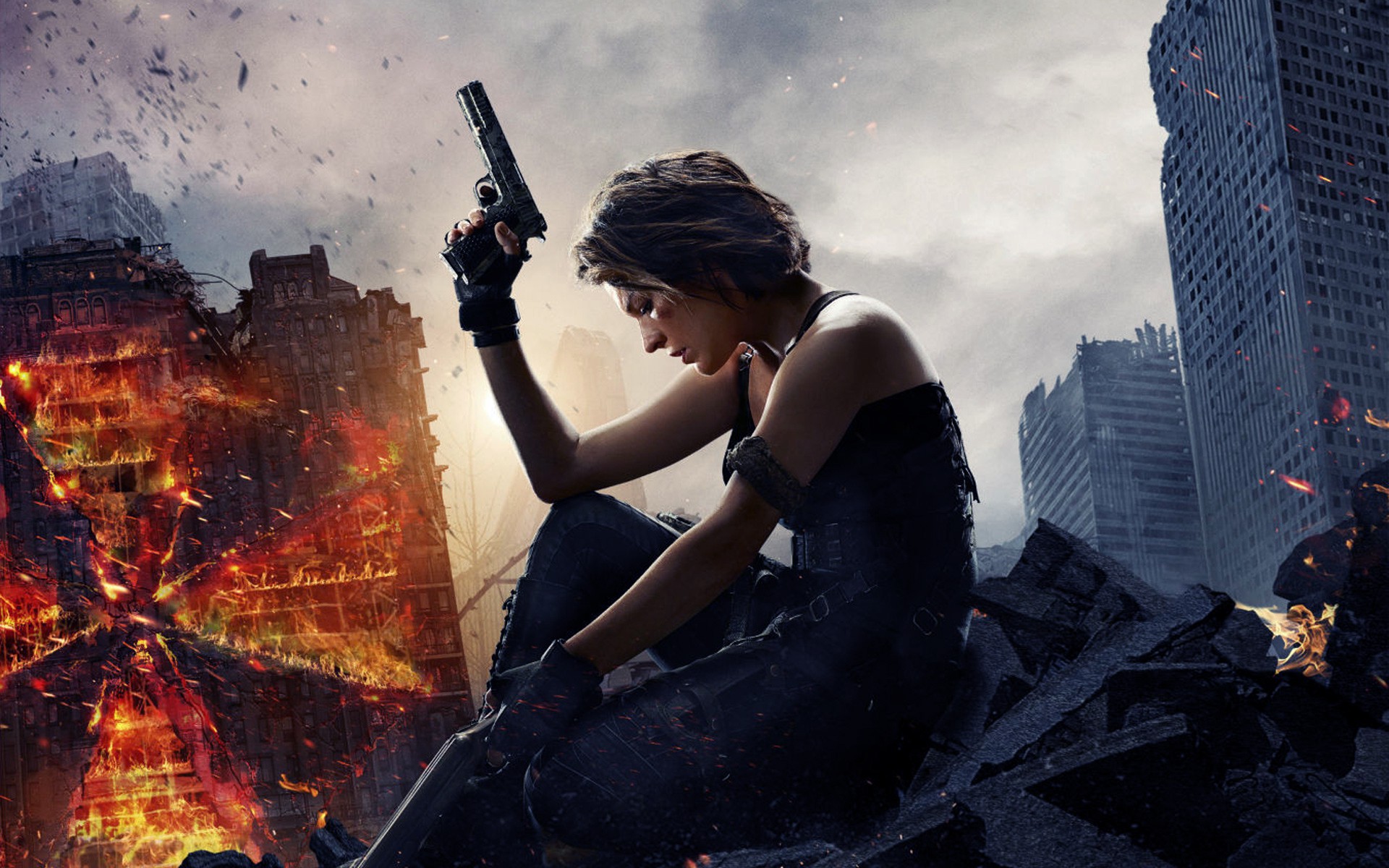As much shade as video game-adapted movies often get thrown at them, and sometimes it’s deserved, it’s impossible to deny the surprise commercial success of Sony Pictures’ and Screen Gems’ Resident Evil movie saga. This action-oriented big screen adaptation of Capcom’s celebrated series of horror-themed video games has been going on for fifteen years, and with its latest release, now spans six Hollywood movies. Finally though, all the way in 2017, it would appear that the Resident Evil movie series is reaching its end, with Resident Evil: The Final Chapter, which has been heavily promoted as the current movie series’ last installment, before it presumably gets a big screen reboot in some other form some years down the line.
In a way, the Resident Evil movies are also critic-proof. Despite plenty of people who complain about them, and again, it can be deserved to an extent, these movies also have a devout cult audience of defenders, who are happy to enjoy them as cheesy B-movies that can be safely divorced from their video game inspirations, which they have virtually nothing to do with, beyond a handful of pilfered characters and story turns. If you’re among that audience, then you might as well stop reading this review here, because you will enjoy Resident Evil: The Final Chapter for what it is. It’s more of the same action-packed silliness, with no regard for continuity or common sense, and if you’ve enjoyed that for five movies now, you’re unlikely to stop enjoying it with the sixth.
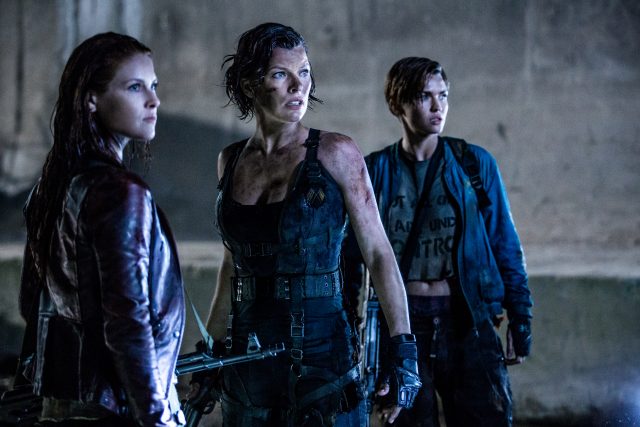
If you’re honestly looking to assess Resident Evil: The Final Chapter purely objectively, putting aside these movies’ license and legacy, I have to admit, that’s kind of a fool’s errand at this point. Six movies in, you really should know what to expect by now, and expecting anything beyond writer-director, Paul W.S. Anderson’s familiar Resident Evil recipe at this point just seems foolish. Still, for those who have read this far, and honestly want to dig into Resident Evil: The Final Chapter from a critical perspective, well, it probably won’t shock you to hear that the movie isn’t very good, at least not objectively. Then again, if you’re actively pumped to see Resident Evil: The Final Chapter, you probably don’t care if the movie is good, and just want to know if it’s fun. Well, it can be, so long as you don’t mind an especially idiotic storyline within a series climax that, while fitting, is still full of continuity errors, directing screw-ups and very little thought.
Milla Jovovich’s Alice is back for the sixth and presumably final time in Resident Evil: The Final Chapter, and her character hasn’t changed a bit. For most of the movie, Alice’s entire character remains ‘zombie-killing badass’, with no other defining traits, and for what it’s worth, Jovovich still works as a leading lady in that respect. Seeing as this is the big finale though (supposedly), we do get a few more answered questions about Alice’s character, which fill in the remaining plot holes that stretch all the way back to the first movie, or at least try to. Obviously, I won’t spoil any of these developments, but I will say that not all fans will be satisfied with the final batch of twists surrounding Alice’s character. Some of them really redefine the character in what’s actually kind of a bad way, to the point where these worse twists start bleeding into the movies that came beforehand, somewhat ruining them for some people who did enjoy them ironically in the past.
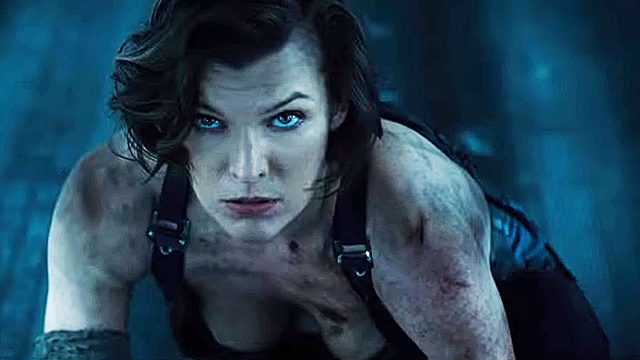
Another frustrating problem for people that actually do enjoy the Resident Evil movies is that some characters are just abruptly dropped with no explanation, or a half-assed throwaway explanation that basically amounts to them dying off-screen. Various surviving characters from the Resident Evil games such as Wentworth Miller’s Chris Redfield, Sienna Guillory’s Jill Valentine, Bingbing Li’s Ada Wong and Johann Urb’s Leon S. Kennedy (along with original characters, Becky and K-Mart), are all just dropped without explanation, with the movie basically leading us to assume that they’re just dead now, and that it can’t be arsed with actually wrapping up any of their character arcs. Hell, Bingbing Li was originally supposed to return as Ada Wong, springboarding off of the conclusion of the previous Resident Evil: Retribution, yet she’s never even mentioned in the movie’s final product. Instead, Resident Evil: The Final Chapter once again focuses squarely on Alice, as if Anderson is worried about suddenly making his wife look bad by having characters from the games steal her thunder. There’s some other original new characters that didn’t exist in the games here too, but as with the former movies, those characters only exist to die, so there’s no use dwelling on them.
The only characters from the games that do return in Resident Evil: The Final Chapter are Ali Larter’s Claire Redfield and Shawn Roberts’ Albert Wesker. This is at least good news, though unfortunately, neither character really does that much in this movie. Claire is essentially treated as a sidekick, who does at least participate in the action scenes, but she serves no other purpose beyond cleaning up Alice’s sloppy seconds, especially when her surviving brother, Chris is just dropped from the franchise without so much as a mention. Wesker has it even worse, since his presence is even more pointless. Wesker simply bumbles around, having supposedly betrayed the characters off-screen after the cliffhanger ending of Resident Evil: Retribution (which is this movie’s lazy explanation for why characters like Ada and Jill are no longer around and Wesker is suddenly an enemy again, I guess), and he’s given nothing else to do beyond stand there and look menacing. Considering that Roberts was such an enjoyably hammy villain over the past two Resident Evil movies, it’s an enormous disappointment to have this climactic installment push him into the background and basically make him a passive lapdog for the real baddie.
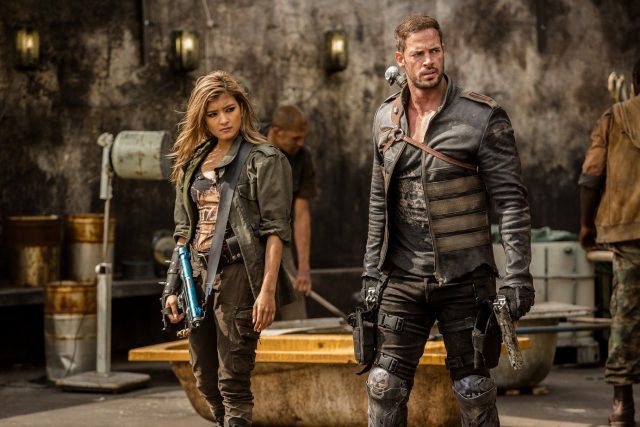
Who is the real baddie, you may ask? It’s Iain Glen’s Dr. Isaacs… From the second and third movies from way back in 2004 and 2007, respectively. Yeah, that’s fairly random, isn’t it? There’s another hasty explanation as to how Isaacs is alive (and don’t worry, it’s just as lazy as the surviving video game character absences), and then he’s just the true mastermind behind everything, to the point where even Wesker is working for him. Because why not, right? To be fair, Glen does class the movie up a bit, but it feels like a cheat to have two movies build up Wesker so much, then suddenly pull a bait-and-switch for the final movie and bring back a former villain that’s been dead since the third movie. It’s tough to talk much about the revived Isaacs without spoilers, but I will say that he’s basically only here because Anderson seemingly wants to tie back to the earlier movies’ villainous forces, even when it doesn’t totally make sense to do so. Like I said, why not, right?
The Resident Evil movie canon collapsed in on itself a long time ago, so you really have to keep your expectations in check with the storyline of Resident Evil: The Final Chapter. It doesn’t seem like Anderson actually jotted down the lore behind these movies, so Resident Evil: The Final Chapter has yet again re-written the origins of Alice, the Red Queen and the Umbrella Corporation. I suppose that’s what fans of these movies have come to expect by now, so complaining about it is probably just going to be redundant.
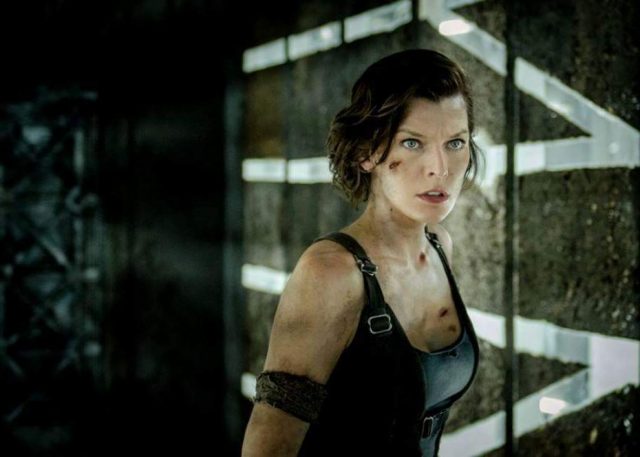
That said though, when Resident Evil: The Final Chapter makes several more obvious retcons to its already simplistic and shaky climactic storyline, it becomes all the more distracting when the movie tries to call back to its predecessors. This just draws attention to the missing characters, the altered plot threads, and the lack of justification for why the former movies are being revisited the way they are.
The most blatant example to this effect is Alice and co. having to return to The Hive, the underground Umbrella Corporation complex from the first movie that never existed in the source games, to find the all-important macguffin, a magic anti-virus that can completely destroy the T-Virus all across the world (I know, just go with it). Well, if a bullshit cure-all to the T-Virus was in The Hive the whole time, what was the point of this entire movie series?! The return to The Hive just ultimately feels like a forced, unearned way to have this movie series seem like it’s coming full circle, when in reality, it’s still just lazily moving from one zombie/mutant-killing set piece to the next. It’s just throwing The Hive back in this time because that’s where this series started, and I guess that’s where it should end. Again, why not, right?
Paul W.S. Anderson has yet again both written and directed Resident Evil: The Final Chapter, on top of being a lead producer, and as I’ve already explained regarding the movie’s plot, that basically amounts to more of the same from the past couple of movies in the series. In this case though, there really is no excusing some of Anderson’s sloppy directing, which somehow becomes even less polished than it was in the original Resident Evil movie, Resident Evil: Afterlife or Resident Evil: Retribution, the series’ former movies that Anderson also directed aside from this one.
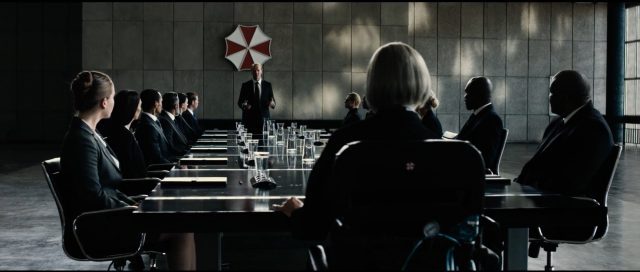
For whatever reason, Anderson just went apeshit with the editing in Resident Evil: The Final Chapter, which I and the company at my screening managed to tolerate just fine, but I can definitely see many other viewers walking out of this movie with a migraine, especially if they’re watching it in 3D. The editing changes several times in less than a second at worst, and this makes several action scenes needlessly confusing, to the point where you can’t even tell what’s going on in a fistfight at worst! I suspect that part of this editing trickery is to hide some less-than-perfect creature effects, but either way, the hyperactive editing and camera work will get on your nerves extremely quickly. That’s before considering the overblown litany of jump scares in the movie’s first half especially, which are extremely overdone, irritating and often unnecessary, often existing to try and mask the fact that the movie’s slower first half is surprisingly devoid of real tension outside of the action scenes.
Beyond that, Anderson also just makes some plain weird directing choices at various points in Resident Evil: The Final Chapter. The beginning of the movie outlines this very lengthy backstory (which, again, is not perfectly consistent with the former movies), only to then go into an extended sequence of Alice going to fight some zombies, mutants or soldiers, getting knocked out, and ending up somewhere else, lather, rinse, repeat. Then, towards the end of the movie, Anderson throws in this really confusing action style that’s sort of a callback to Guy Ritchie’s Sherlock Holmes movies (that’s fairly random), only it’s much sloppier and feels awkwardly crowbarred in. There are times where Anderson’s directing stabilizes, and you at least get a better action scene every so often in Resident Evil: The Final Chapter, but there are other moments where it’s clear that he’s not really trying, and he just wants to get the movie over with so he can move on to some other project/franchise.
Paul Haslinger composes the soundtrack for Resident Evil: The Final Chapter, which feels fitting, since Haslinger is most associated with manic, high-charged scores for B-movies, and is a particularly frequent collaborator with Resident Evil movie studio, Screen Gems, being their former most frequent composer for the Underworld movies. Haslinger has never scored a Resident Evil movie before now, but he fits right in with Anderson’s especially hyperactive directing style here. For what it’s worth too, Haslinger’s score is actually not too bad. It’s a hard-rocking, blood-pumping score that can occasionally feel obnoxious, but like I said, it does fit with the style of the movie, and it does at least create a lot of excitement, even when the actual direction behind the action scenes is noticeably sloppier.
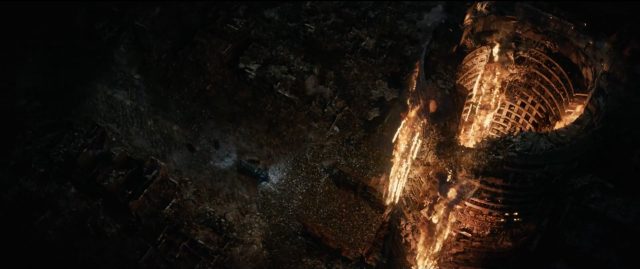
The rest of the audio work is also incredibly imposing and pronounced. In fact, if anything, it’s almost too pronounced here. For some reason, the audio engineers, and presumably Anderson too, have really cranked up several facets of the sound mixing, and this makes Resident Evil: The Final Chapter deafeningly loud in several scenes, somewhat unrealistically. My screening was in an IMAX theatre as well, so you can only imagine how much I and the audience of that screening got blasted with this movie’s overbearing audio. If you enjoy your action cranked to the max, then Resident Evil: The Final Chapter definitely delivers on that front, but if you plan to watch it in theatres, bear in mind that if your hearing is delicate, your ears are going to hurt by the time the credits roll. In that case, I wouldn’t even go near IMAX screenings of this movie either, with the movie’s IMAX 3D cut almost seeming to go out of its way to try and burst your eardrums at times.
Resident Evil: The Final Chapter can be very visually uneven at the best of times. On the one hand, its set design is actually not too bad, and there are a few visual beats in the movie that do convey a nice sense of grime, scale or gore. On the other hand though, some (though not all) of the creature effects can be pretty dodgy, with a few instances of CG really not feeling in any way realistic or believable. That’s before the really super-charged, hyperactive editing that leads to the more frequently confusing action scenes as well. Like I said, I have the sneaking suspicion that the manic editing is partially to try and cover up the creature effects that didn’t turn out that well in certain scenes.
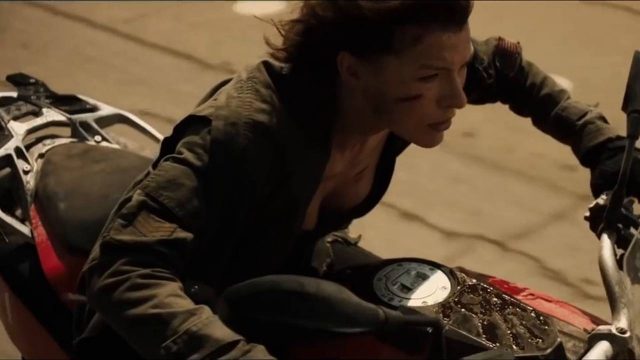
As I mentioned, my screening of Resident Evil: The Final Chapter was in IMAX 3D as well, and for the most part, these enhancements didn’t add too much to the production. The main contribution of the IMAX theatre is cranking up the already-overpowered sound mixing, and the 3D presentation of the movie is generally pretty lacklustre and sloppily-implemented. The 3D adds very little to the movie, and it definitely doesn’t get along with the frequently darker cinematography and choppy action scenes that take place later in the movie especially. This underwhelming 3D is especially disappointing when you consider that 2010’s Resident Evil: Afterlife and 2012’s Resident Evil: Retribution actually had pretty decent, if slightly gimmick-y 3D presentations. Strangely, in some ways, it almost feels like the production values went down in Resident Evil: The Final Chapter, rather than up, and for a climactic installment that took five years to make it to the big screen, that’s pretty inexcusable.
It shouldn’t come as a shock to anyone by this point that Resident Evil: The Final Chapter is a schlock-y, objectively sub-par movie that feels right at home in the dreary month of January. Much like with Screen Gems’ other major January movie release of 2017, Underworld: Blood Wars, this movie has absolutely nothing to offer to people who aren’t already fans of the Resident Evil movie series. If you’re a discerning fan of the Resident Evil video games, then you also won’t be shocked to know that Resident Evil: The Final Chapter still barely has any connection to the style, canon or personalities of its source games at all, and is still largely telling its own story in its own highly different universe, albeit one that can be easily considered to be inferior to the universe and franchise of the video games that inspired it.
If there’s good news for the detractors of the Resident Evil movies and their ilk though, it’s that Resident Evil: The Final Chapter pretty much represents one of the final dying gasps of yesterday’s video game-adapted movies; The quick, dirty schlock that studios put very little effort into, and assume no one beyond 10 to 14-year-old boys would be interested in. Sure, some of those movies, much like the Resident Evil movie series as a whole, can be enjoyed ironically by less discerning B-movie enthusiasts, but it is likely best that the long-running Resident Evil movie series finally end here. 2016 in particular began the era of higher-effort video game-adapted movies that, while still possessing their share of shortcomings, represent cinematic products that studios are actually starting to put proper effort and production values into, while also marketing them to a smarter and more sophisticated audience. Slowly, but surely, video game-adapted movies are getting better, and that means that the lower standard of the Resident Evil movies is becoming gradually less acceptable in mainstream cinema.

That said, if you’ve enjoyed the five movies that came beforehand, you’ll still have fun with Resident Evil: The Final Chapter. For better or worse, it gives you more of what you would come to expect from these movies, and it provides a serviceable, if also predictably sloppy climax and apparent conclusion to the saga. Like I said though, if you aren’t already invested in the proper conclusion of the Resident Evil movies, then Resident Evil: The Final Chapter can be safely skipped, as it has nothing of value to offer you.
You can dig into this movie all you like, but some movies and movie franchises defy critical analysis, with the Resident Evil movies being a key example. When it comes to the Resident Evil movies, much like Screen Gems’ other biggest current movie franchise, Underworld, you either like them or you don’t, and that’s all there is to it. The same remains true of Resident Evil: The Final Chapter. I guess all that remains to be said then is that this movie series died the way it lived.

